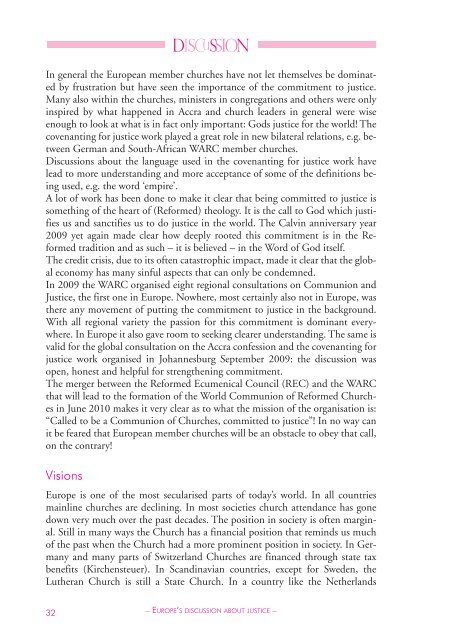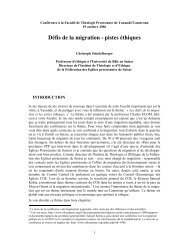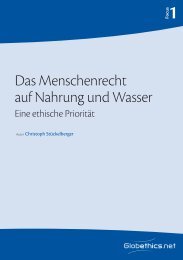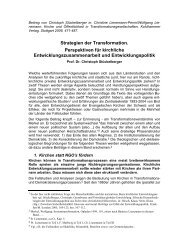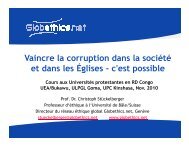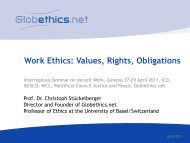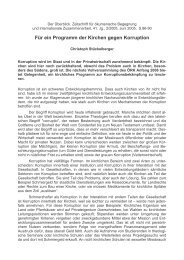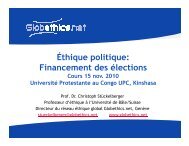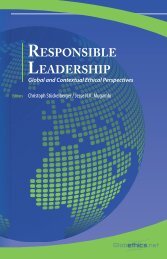BREAK THE CHAINS OF OPPRESION AND THE YOKE OF ...
BREAK THE CHAINS OF OPPRESION AND THE YOKE OF ...
BREAK THE CHAINS OF OPPRESION AND THE YOKE OF ...
Create successful ePaper yourself
Turn your PDF publications into a flip-book with our unique Google optimized e-Paper software.
In general the European member churches have not let themselves be dominated<br />
by frustration but have seen the importance of the commitment to justice.<br />
Many also within the churches, ministers in congregations and others were only<br />
inspired by what happened in Accra and church leaders in general were wise<br />
enough to look at what is in fact only important: Gods justice for the world! The<br />
covenanting for justice work played a great role in new bilateral relations, e.g. between<br />
German and South-African WARC member churches.<br />
Discussions about the language used in the covenanting for justice work have<br />
lead to more understanding and more acceptance of some of the definitions being<br />
used, e.g. the word ‘empire’.<br />
A lot of work has been done to make it clear that being committed to justice is<br />
something of the heart of (Reformed) theology. It is the call to God which justifies<br />
us and sanctifies us to do justice in the world. The Calvin anniversary year<br />
2009 yet again made clear how deeply rooted this commitment is in the Reformed<br />
tradition and as such – it is believed – in the Word of God itself.<br />
The credit crisis, due to its often catastrophic impact, made it clear that the global<br />
economy has many sinful aspects that can only be condemned.<br />
In 2009 the WARC organised eight regional consultations on Communion and<br />
Justice, the first one in Europe. Nowhere, most certainly also not in Europe, was<br />
there any movement of putting the commitment to justice in the background.<br />
With all regional variety the passion for this commitment is dominant everywhere.<br />
In Europe it also gave room to seeking clearer understanding. The same is<br />
valid for the global consultation on the Accra confession and the covenanting for<br />
justice work organised in Johannesburg September 2009: the discussion was<br />
open, honest and helpful for strengthening commitment.<br />
The merger between the Reformed Ecumenical Council (REC) and the WARC<br />
� � � � �<br />
that will lead to the formation of the World Communion of Reformed Churches<br />
in June 2010 makes it very clear as to what the mission of the organisation is:<br />
“Called to be a Communion of Churches, committed to justice”! In no way can<br />
it be feared that European member churches will be an obstacle to obey that call,<br />
on the contrary!<br />
Visions<br />
Discus sion<br />
Europe is one of the most secularised parts of today’s world. In all countries<br />
mainline churches are declining. In most societies church attendance has gone<br />
down very much over the past decades. The position in society is often marginal.<br />
Still in many ways the Church has a financial position that reminds us much<br />
of the past when the Church had a more prominent position in society. In Germany<br />
and many parts of Switzerland Churches are financed through state tax<br />
benefits (Kirchensteuer). In Scandinavian countries, except for Sweden, the<br />
Lutheran Church is still a State Church. In a country like the Netherlands<br />
������������������������������������������������<br />
� � � � ���������������������<br />
�<br />
32<br />
– EUROPE’S DISCUSSION ABOUT JUSTICE –


